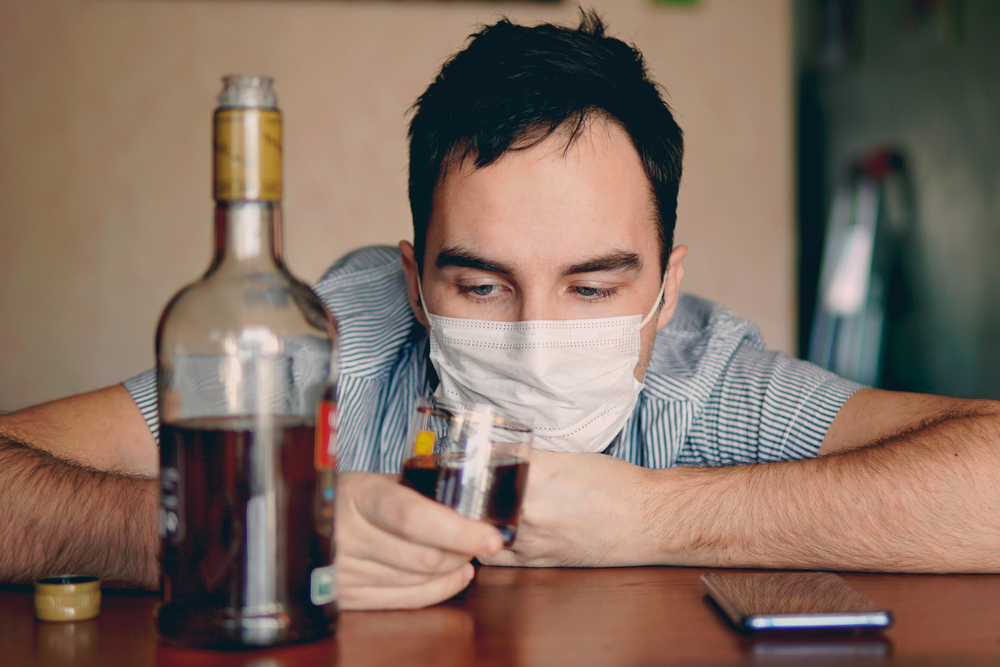The COVID-19 pandemic has impacted our lives forever. It’s changed the way we work, learn, travel and socialise which is reflected in a rise of addictions around the world. As well as increased stress from job losses, school closures and health concerns, restrictions imposed by governments have impacted drug use patterns globally. In Britain, reports show nearly 8.5 million adults are now drinking at high risk and the number of people seeking help for opiate addiction is at its highest level since 2015 (1).
Has COVID made us a more addictive nation or were we already heading for a national crisis? In this article, Delamere wellness retreat examines some of the reasons for an increase in alcohol addiction, drug addiction and other addictions, related to the pandemic, and how we can help to reverse this trend. We have a team of qualified experts who specialise in addiction support and are here to help you if you’ve been impacted by recent events.

Reasons for a rise in addiction during COVID-19
Research suggests that the most common reasons for a rise in addictions are boredom, stress, more time and isolation (2). At the height of the pandemic, border closures interrupted usual drug shipping routes which affected the availability of certain street drugs and the closure of pubs and restaurants led to an increase in home drinking, driving up supermarket alcohol sales. Addictive behaviours, such as chemsex, may also have risen in popularity due to home drug abuse (3).
In April and May 2020, a global survey of addiction medicine professionals from 77 countries revealed there had been some changes in drug use during the early stages of the pandemic. Most countries reported an increase in alcohol intake and the non-medical use of sedatives, such as benzodiazepines, as well as an increase in prescription opioids. However, in some parts of the world, drug taking had decreased due to reduced contact with other people who use drugs, restricted ability to purchase drugs, reduced access to recreational spaces, and reduced availability of drugs (4).
Changes in alcohol habits during COVID-19
In 2020, Alcohol Research UK investigated the change in people’s drinking habits during the first lockdown. The results were surprising. Despite media reports of people stockpiling alcohol, 1 in 3 people actually admitted to cutting down or quitting alcohol altogether (5). However, there is evidence that people who were already abusing alcohol increased their drinking to problematic levels.
Later that same year, the British Liver Trust reported a 500% increase in calls to its helpline (6) and in 2021 Public Health England (PHE) reported “significantly higher alcoholic liver deaths, likely because of increased consumption among an already at-risk group of heavy drinkers” (7).
Changes in drug habits during COVID-19
Anecdotal reports in the UK suggest that drug habits have also changed in response to the global impact of the pandemic. Higher wholesale prices of heroin and cocaine have led to an increase in fentanyl addiction. While online forums have hinted at a ketamine drought and a reduced demand for ‘party drugs’ such as amphetamine and MDMA (2).
A new survey in 2022 by the EU drugs agency (EMCDDA) revealed that the biggest change in drug use was amongst cannabis and ecstasy users. While recreational use of cannabis increased, fewer people were found to be abusing ecstasy.
With more opportunities to abuse drugs behind closed doors, the amount and frequency of drug use also changed. People who were already suffering with a substance use disorder pre-pandemic were likely to worsen during this period, due to increased psychological stress and lack of access to addiction support services (8).
Rise in drug and alcohol-related deaths during COVID-19
One way of ascertaining the increase in addictions during the pandemic is to explore data on hospital admissions and deaths. A Public Health England (PHE) report showed that increased consumption of alcohol at home contributed to a 20% increase in deaths from alcohol-related diseases. Sales of alcohol rose by 25% between 2019 and 2020 and deaths from alcohol poisoning increased by 15.4%. The following year, there was a 58.6% increase in high-risk drinking. Drug-poisoning deaths in England and Wales also reached a record high due to the increase in cocaine and opiate abuse (7).
Rise of other addictions during COVID-19
Alcohol and drug addiction weren’t the only compulsive disorders to rise during the time of coronavirus. Several factors led to an increase in other addictive behaviours, such as gaming addiction, gambling addiction and internet addiction.
During lockdowns, boredom led to an increase in gaming, especially among young people, who were forced to have lessons at home. Many parents didn’t have the time or knowledge required to become full-time teachers and relied on technology to keep children entertained during working hours.
Stress, social isolation, job insecurity and unemployment were factors that could have led to an increase in gambling. People with existing gambling disorders were especially vulnerable and the pandemic made those who had previously sought treatment for gambling addiction prone to relapse (9).
During COVID-19 we were also glued to our phones waiting for the latest government update on rules and restrictions. One study reported a significant increase in levels of anxiety, depression and smart phone addiction from 2020 to 2021, with smart phone addiction rising from 39% to 50% (10).
How can Delamere help with addiction?

If you have developed an addiction as a result of COVID-19 or otherwise and would like to speak to someone, we’re here to help. Delamere has a multi-disciplinary team of holistic experts who help people overcome alcohol addiction, drug addiction and other addictions at our purpose-built residential retreat in Cheshire.
We will help you identify the cause of your addictive behaviour and develop tools to allow your recovery to begin. If you are suffering with a substance use disorder your time with us will likely start with a medical alcohol detox or drug detox managed by our caring and compassionate clinicians.
Our programmes include one-to-one therapy and group counselling sessions, as well as a range of evidence-based techniques and somatic healing experiences. We take a person-centred approach to our treatment plans to find what works for you and give you the best chance of leaving your addiction behind.
If you think you may be suffering with an addiction, call us confidentially to speak to a member of the team today. Contact Delamere
References
2. Dr Will Lawn and Martine Skumlien. How is the Covid-19 pandemic changing our use of illegal drugs? An overview of ongoing research. Society for the Study of Addiction. 28 May 2020 (Last updated 24 April 2022).
3. Zaami Simona, Marinelli Enrico, Varì Maria Rosaria. New Trends of Substance Abuse During COVID-19 Pandemic: An International Perspective. Frontiers in Psychiatry. Vol. 11. 2020. https://www.frontiersin.org/article/10.3389/fpsyt.2020. DOI=10.3389/fpsyt.202.
4. World Drug Report 2021 (United Nations publication, Sales No. E.21.XI.8).
5. https://alcoholchange.org.uk/blog/2020/covid19-drinking-during-lockdown-headline-findings.
6. https://www.bbc.co.uk/news/uk-england-essex-53684700.
7. https://www.gov.uk/government/publications/alcohol-consumption-and-harm-during-the-covid-19-pandemic.
8. According to a study by WHO in 14 countries, analyzing 18 potentially stigmatizing conditions – Source: Stigma, social inequality and alcohol and drug use (2008) – Robin Room et al. Online access, 16 June, 2018.
9. Hodgins, David C.a; Stevens, Rhys M.G.b The impact of COVID-19 on gambling and gambling disorder: emerging data, Current Opinion in Psychiatry: July 2021 – Volume 34 – Issue 4 – p 332-343 doi: 10.1097/YCO.0000000000000709.
10. Catling, J. C., Bayley, A., Begum, Z., Wardzinski, C., & Wood, A. (2022). Effects of the COVID-19 lockdown on mental health in a UK student sample. BMC psychology, 10(1), 118. https://doi.org/10.1186/s40359-022-00732-9.






